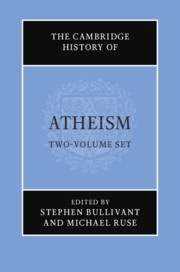Book contents
- The Cambridge History of Atheism
- The Cambridge History of Atheism
- Copyright page
- Dedication
- Contents
- Acknowledgments
- Contributors
- Introduction
- Part I Preliminaries
- Part II Atheisms in History
- 4 Pre-modern Japan
- 5 Ancient Greece
- 6 The Roman Empire
- 7 India: 1500 BC to AD 1200
- 8 Christian Europe
- 9 The Islamic World
- Part III Reformation, Renaissance, Enlightenment
- Part IV Classical Modernity: Philosophical and Scientific Currents
- Part V Classical Modernity: Social and Political Currents
- Part VI Twentieth and Twenty-First Centuries: Intellectual and Artistic Currents
- Part VII Lived Atheism in the Twentieth- and Twenty-First Centuries: Case-Studies
- Part VIII Emerging Atheisms in the Twenty-First Century
- Part IX Conclusion
- Index
- References
9 - The Islamic World
from Part II - Atheisms in History
Published online by Cambridge University Press: 25 September 2021
- The Cambridge History of Atheism
- The Cambridge History of Atheism
- Copyright page
- Dedication
- Contents
- Acknowledgments
- Contributors
- Introduction
- Part I Preliminaries
- Part II Atheisms in History
- 4 Pre-modern Japan
- 5 Ancient Greece
- 6 The Roman Empire
- 7 India: 1500 BC to AD 1200
- 8 Christian Europe
- 9 The Islamic World
- Part III Reformation, Renaissance, Enlightenment
- Part IV Classical Modernity: Philosophical and Scientific Currents
- Part V Classical Modernity: Social and Political Currents
- Part VI Twentieth and Twenty-First Centuries: Intellectual and Artistic Currents
- Part VII Lived Atheism in the Twentieth- and Twenty-First Centuries: Case-Studies
- Part VIII Emerging Atheisms in the Twenty-First Century
- Part IX Conclusion
- Index
- References
Summary
This chapter surveys phenomena and trajectories related to atheism, doubt, and freethought in the medieval Islamic world. Since the existence of God was thought to be rationally proven by both Muslim philosophers and theologians alike, there were next to no Muslims that came to espouse atheism in the Middle Ages. However, there were a number of authors and scholars – some of them highly influential – who can be called freethinkers, though no such term existed in the Arabic or Persian of the time. Similar to their seventeenth-century European counterparts, the medieval Muslim freethinkers held that arguments and positions about truths should be based on reason and demonstrative argumentation rather than revelation and tradition. Some of them directed venomous criticism against prophecy and the Quran, which they all but rejected. Perhaps surprisingly, many of the works (or citations of them) of the medieval Muslim critics of religion have survived to this day.
- Type
- Chapter
- Information
- The Cambridge History of Atheism , pp. 159 - 180Publisher: Cambridge University PressPrint publication year: 2021



